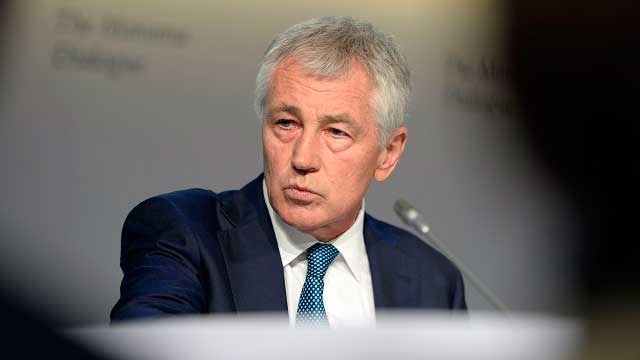SUMMARY
This is AI generated summarization, which may have errors. For context, always refer to the full article.

SINGAPORE – (UPDATED) US Defense Secretary Chuck Hagel warned China Saturday, May 31, against “destabilizing actions” in the South China Sea, and backed Japan’s plans to take on a more muscular military role as a counterweight to Beijing.
Stressing US commitments to allies and friends in Asia, Hagel called for a peaceful resolution of maritime disputes and issued a blunt message to China, which was represented by a high-level military delegation at a security forum in Singapore.
“In recent months, China has undertaken destabilizing, unilateral actions asserting its claims in the South China Sea,” Hagel told the annual Shangri-La Dialogue.
He accused China of restricting the Philippines’ access to Scarborough Shoal, putting pressure on Manila’s long-standing presence in Second Thomas Shoal, beginning land reclamation at various locations and moving an oil rig into disputed waters with Vietnam. (READ: Hagel: PH-US war games ‘important to regional security’)
Hagel said that while the United States does not take sides on rival claims, “we firmly oppose any nation’s use of intimidation, coercion, or the threat of force to assert these claims.”
“The United States will not look the other way when fundamental principles of the international order are being challenged,” he said.
China reacted angrily to Hagel’s comments, with Deputy Chief of the General Staff of the People’s Liberation Army (PLA) Wang Guanzhong describing them as baseless.
“This speech is full of hegemony, full of incitement, threats, intimidation,” Wang was quoted as saying by a reporter from state broadcaster China Central Television.
The lieutenant-general is due to make his own speech on Sunday.
Veteran diplomat Fu Ying, head of the foreign affairs committee in China’s rubber-stamp parliament, did not refer to Hagel by name but said countries should “not keep resorting to the 20th century mentality which is about war and conflict.”
She added that “in the 21st century, we don’t have a world state and no country can claim that they own the law, they own the management of the sea.
“All countries have to work together based on mutual respect,” she said.
Bitter disputes
Four Southeast Asian states – Brunei, Malaysia, the Philippines and Vietnam – claim parts of the South China Sea, which China claims in nearly its entirety, citing what it calls historic rights. Taiwan is the sixth claimant.
In the latest outbreak of tensions, Vietnam accused Chinese warships Thursday, May 29, of pointing weapons at their vessels during an escalating standoff near an oil rig in contested waters. There have also been ramming incidents involving boats from both sides.
The South China Sea straddles vital shipping lanes, and some of the disputed islets and shoals are believed to sit atop vast energy deposits.
China is also in dispute with Japan over islands in the East Sea, which Tokyo calls Senkaku and Beijing refers to as Diaoyu.
Last year, China declared an air defence identification zone in the East Sea, including over the outcrops, which are under Japan’s administration.
Greater role for Japan
In his speech, Hagel reiterated that the United States opposes “any effort by any nation to restrict overflight or freedom of navigation, whether from military or civilian vessels, from countries big or small.”
Restating a US declaration, he said “the Senkaku Islands fall under our mutual defence treaty with Japan” and backed Tokyo’s plans to play a greater role in maintaining security in Asia.
Japanese Prime Minister Shinzo Abe opened the Singapore forum Friday by saying his country would play a more “proactive” role in Asian security, including providing coast guard vessels to the Philippines and potentially Vietnam.
Hagel also pledged support to countries that are moving towards democracy, notably Myanmar.
He urged the Thai military junta that took power in a coup on May 22 to release people they have detained, end restrictions on freedom of expression, and “move immediately” to hold elections.
Hagel said that until that happens, the Pentagon will continue to suspend and reconsider US military assistance and engagements with Thailand.
Despite tough words for China’s behaviour in disputed Asian waters, Hagel also cited efforts to forge a “new model of relations” between Beijing and Washington, including military cooperation and multinational exercises.
“The United States is reaching out to China – because we seek to expand prosperity and security for all nations of the region,” he said. – Rappler.com
Add a comment
How does this make you feel?
There are no comments yet. Add your comment to start the conversation.